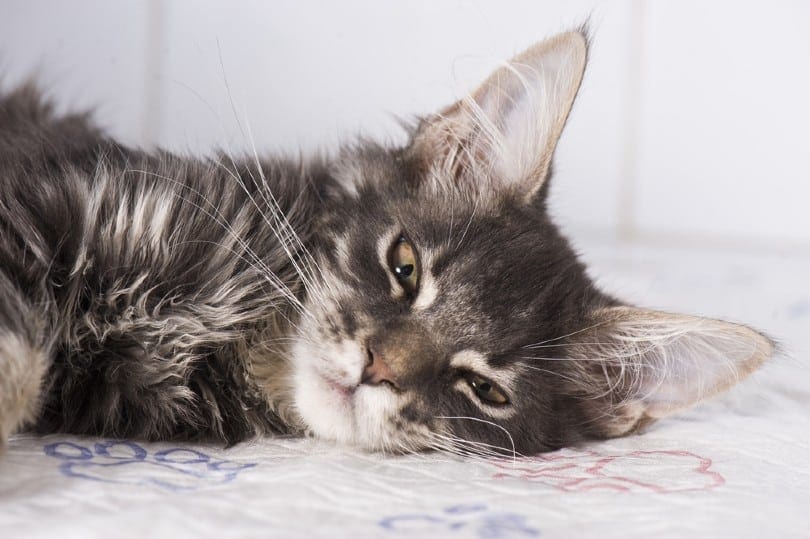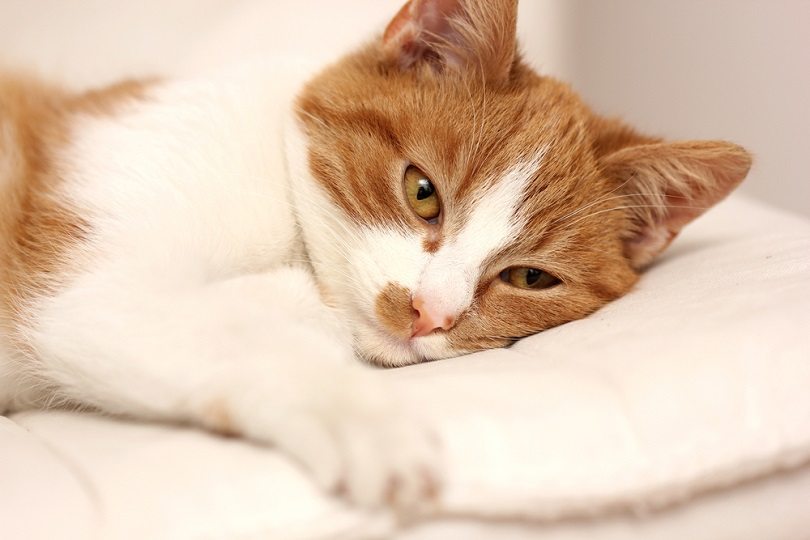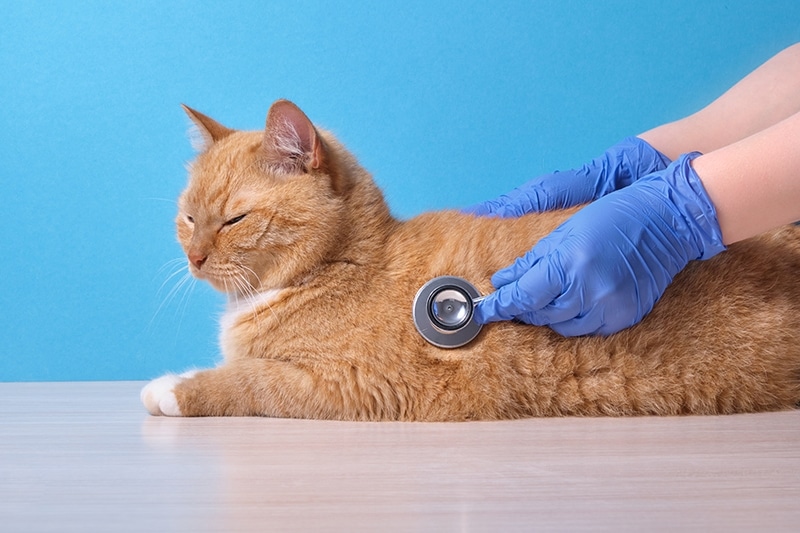Heart disease in cats does not define a single illness, but rather multiple conditions with different levels of severity. Some heart diseases are mild and do not cause problems or require treatment, but others can worsen and lead to heart failure.
Cardiac disease is when a cat’s heart is no longer working properly. The heart is essentially a pump made of muscles that push the blood through the vessels throughout the body. When this pump no longer works properly, heart problems occur.
Cardiovascular disease can be a primary or secondary condition of other diseases. It occurs especially in senior cats but can also be found in kittens (as early as 3 months of age). Heart disease can endanger a cat’s life when it leads to fluid retention in the lungs and body cavities.

What Is Heart Disease?
The heart is a muscle that works like a pump. With each beat, it pumps blood into the body in a movement called a heartbeat, which is different depending on the species. In cats, the heart beats 120–140 times per minute.1
A cat’s heart has an ovoid shape and is the size of a walnut. It’s located in the chest cavity between the two lungs and has four chambers (two atria and two ventricles) and two valves (mitral and tricuspid) that regulate blood flow. It is made up of three concentric layers: the endocardium, the myocardium, and the epicardium. Externally it is covered by a sack full of liquid called the pericardium, which has different roles.
When this organ no longer functions properly, heart diseases occur. They are divided into two categories: congenital (present from birth) or acquired (occur during life). Both congenital and acquired pathologies can be hereditary.
Congenital Heart Disease
Congenital heart disease is present from birth. These are defects in the structures and functions of the cardiovascular system that cause malformations of the heart during embryonic development and affect only one kitten. The cause can also be a hereditary genetic change, in which the disease is transmitted to one or more kittens.
Although certain clinical signs can be identified from an early age, there are situations in which these diseases can remain undetected for years.
The most common congenital heart diseases in cats are:
- Patent ductus arteriosus (PDA) — The ductus arteriosus is a blood vessel that connects the fetal aorta to the pulmonary artery. In normal kittens, this blood vessel closes 1–2 days after birth. In kittens suffering from PDA, this vessel remains open and can lead to heart failure if it is not surgically corrected a few months after birth.
- Ventricular septal defect — A hole in the ventricular septum (tissue that separates the left and right ventricle). Cats can develop congestive heart failure when the hole in the ventricular septum is large enough.
- Mitral valve dysplasia — Normally, the mitral valve keeps blood flowing in one direction (from the left atrium to the left ventricle). In cats suffering from this condition, the mitral valve enables blood to flow back into the left atrium when the left ventricle contracts.
- Stenosis (aortic or pulmonary) — This is the narrowing of the aorta or pulmonary artery.
Acquired Heart Disease
Acquired heart diseases occur most frequently in adult/senior cats and are due to changes in the structure of the heart, leading to its abnormal function.
Some cases may be due to hereditary factors that progress with age. The most well-known and frequent condition is cardiomyopathy, a disease that affects the heart muscle. The cause is not known, but genetic aspects and lifestyle elements (weight, physical activity, and diet) can play crucial roles. In some cases, it can occur as a secondary condition; for example, it can occur secondary to thyroid disease.
The most common hereditary heart diseases in cats are:
- Hypertrophic cardiomyopathy — This is a thickening of the wall in the left ventricle.
- Dilated cardiomyopathy (DCM) — The heart muscle, especially the left ventricle, weakens and does not contract normally, making the heart bigger. DCM can occur in cats that do not receive enough taurine in their diet. It is a rare condition because most cats get taurine (amino acid) from food.
- Mitral valve insufficiency — With age, the mitral valve of the heart can become less tight and cause the blood to leak from the left atrium to the left ventricle. In the early stages, a heart murmur can be heard, and as the disease progresses, it can lead to heart failure.
- Persian
- Sphynx
- Norwegian Forest Cat
- Bengal
- Turkish Van
- Maine Coon
- Ragdolls
- American Shorthair
- British Shorthair

What Are the Signs of Heart Disease?
The clinical signs of heart disease in cats differ depending on the type. Most cats do not show any clinical signs of heart disease until it progresses. A common clinical sign of heart disease is coughing, but in cats, this is rarely seen (unlike in dogs or humans).
Cats can also have a low exercise tolerance, but this sign is hard to notice because most cats live indoors and don’t get the chance to exercise extensively. As the disease progresses, a low tolerance for daily activities can be noticed: Your cat will become lazier, sleep more, and hide in various places, especially under the furniture.
The most common clinical signs of heart problems in cats are as follows:
- Fainting
- Lethargy
- Weight loss
- Low appetite
- Slowed growth rate (in kittens)
- Difficulty breathing (dyspnea)
- Intensification of breathing on effort
- Sudden paralysis of the hind paws, accompanied by pain due to thromboembolism

What Are the Causes of Heart Disease?
One in 10 cats suffers from heart disease, and most of the time, it is due to a heart anomaly. Heart disease is a precursor to congestive heart failure. This can happen if a heart disease in a cat is not treated in time or is ignored.
- Cats that suffer from congenital heart disease have it from birth. It can also be inherited from their parents.
- Acquired heart disease can occur at any time in a cat’s life and depends on the heart structure. It can be caused by bacteria, viruses, fungi, etc. or occur as a result of chronic diseases or medications that affect other areas of the cat’s body. Other causes of acquired heart disease include:
- Feline myocarditis — This is inflammation of the heart muscle.
- Myocardial infarction — This has as a substrate the blockage of an artery at the level of the heart, most frequently by a blood clot. The sudden stop of the arterial flow at the level of the heart muscle leads to the death of the cardiac tissue in that place.
- Unclassified cardiomyopathies — This is when no specific causes are found.
Heart diseases have certain stages, and with them, the veterinarian can determine how severe your cat’s condition is.

How Do I Care for a Cat With Heart Disease?
The most important thing that you can do is properly administer the medications prescribed by the veterinarian and notify them if you encounter difficulties or if your cat’s clinical signs worsen.
- Be aware of your cat’s activity level, their ability to make an effort, and the interest of your cat to get involved in family activities. This aspect is important because this way, you will know how the disease is evolving.
- Keep a record of their appetite and ability to breathe comfortably (or not).
- Note the presence of any clinical signs, especially coughing or excessive fatigue.
- Do not stop the administration of the medication or change its dosage before consulting your veterinarian. Most medications are necessary to keep your cat alive.
- Do not restrict the amount of water that your cat consumes, even if your pet urinates more than usual, unless you have been instructed to do so by your vet.
- Take your cat to the vet for periodic evaluations. Be prepared to answer questions related to your cat’s activity, appetite, ability to sleep comfortably, respiratory rate, resistance to exertion, coughing, and overall quality of life.
- If your cat is breathing with difficulty, contact the veterinarian immediately.
The evolution of your cat’s illness depends on the severity of the condition, their response to treatment, your vet’s recommendations, and your observations. The tests performed to monitor the progression will influence your vet’s decision regarding your cat’s therapy and prognosis.

Frequently Asked Questions (FAQs)
How Long Can Cats Live With Heart Disease?
Many cats live with heart disease their entire lives without showing any clinical signs, but it depends on how advanced the condition is. Sometimes, cats live a long time with chronic heart failure if medication compensates for it. That said, cats suffering from congestive heart failure can live up to 1 year after they have been diagnosed.
Is My Cat in Pain With Heart Disease?
Heart disease isn’t usually painful in cats, but it can have a major impact on their life if it affects their hind limbs (when a clot forms). It can lead to weakness or paralysis of the limbs, and this requires the immediate intervention of the veterinarian.

Conclusion
Heart diseases in cats can be congenital (born with them) or acquired (occur in adult cats). Both types can be hereditary, i.e., inherited from the parents. Cats can suffer from several types of heart disease, but the most common is cardiomyopathy (a disease of the heart muscle). Some cat breeds, such as the Maine Coon, Persian, American Shorthair, or British Shorthair, are more prone to certain heart conditions than others. For this reason, cardiac monitoring of these breeds is essential. If you notice your cat exhibiting signs like coughing, fatigue upon exertion, disinterest in daily activities, or paralysis or weakness of the hind limbs, contact the veterinarian.
Featured Image Credit: TShaKopy, Shutterstock





